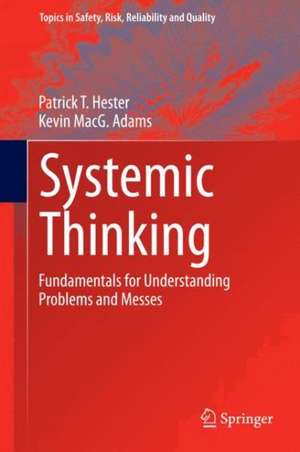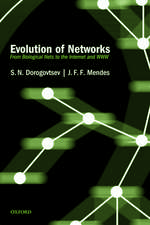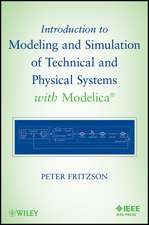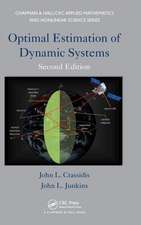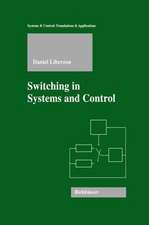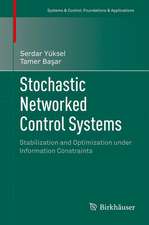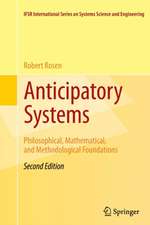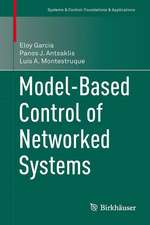Systemic Thinking: Fundamentals for Understanding Problems and Messes: Topics in Safety, Risk, Reliability and Quality, cartea 26
Autor Patrick T. Hester, Kevin MacG. Adamsen Limba Engleză Hardback – 28 iul 2014
This book develops the systemic thinking paradigm, and introduces practical guidelines for the deployment of a systemic thinking approach.
Din seria Topics in Safety, Risk, Reliability and Quality
- 15%
 Preț: 653.65 lei
Preț: 653.65 lei - 15%
 Preț: 658.70 lei
Preț: 658.70 lei - 15%
 Preț: 641.71 lei
Preț: 641.71 lei - 15%
 Preț: 645.79 lei
Preț: 645.79 lei - 15%
 Preț: 641.20 lei
Preț: 641.20 lei - 15%
 Preț: 650.69 lei
Preț: 650.69 lei - 15%
 Preț: 635.96 lei
Preț: 635.96 lei - 15%
 Preț: 635.47 lei
Preț: 635.47 lei - 18%
 Preț: 941.50 lei
Preț: 941.50 lei - 18%
 Preț: 947.85 lei
Preț: 947.85 lei - 19%
 Preț: 546.20 lei
Preț: 546.20 lei - 18%
 Preț: 959.98 lei
Preț: 959.98 lei - 18%
 Preț: 945.92 lei
Preț: 945.92 lei - 15%
 Preț: 639.41 lei
Preț: 639.41 lei - 15%
 Preț: 639.25 lei
Preț: 639.25 lei - 15%
 Preț: 642.51 lei
Preț: 642.51 lei - 15%
 Preț: 651.51 lei
Preț: 651.51 lei - 15%
 Preț: 647.40 lei
Preț: 647.40 lei - 15%
 Preț: 644.95 lei
Preț: 644.95 lei - 18%
 Preț: 890.37 lei
Preț: 890.37 lei - 18%
 Preț: 956.99 lei
Preț: 956.99 lei - 15%
 Preț: 643.65 lei
Preț: 643.65 lei - 24%
 Preț: 961.65 lei
Preț: 961.65 lei - 19%
 Preț: 529.47 lei
Preț: 529.47 lei - 19%
 Preț: 558.69 lei
Preț: 558.69 lei -
 Preț: 451.96 lei
Preț: 451.96 lei
Preț: 404.61 lei
Preț vechi: 499.52 lei
-19% Nou
Puncte Express: 607
Preț estimativ în valută:
77.42€ • 80.83$ • 64.08£
77.42€ • 80.83$ • 64.08£
Carte tipărită la comandă
Livrare economică 01-07 aprilie
Preluare comenzi: 021 569.72.76
Specificații
ISBN-13: 9783319076287
ISBN-10: 3319076280
Pagini: 264
Dimensiuni: 155 x 235 x 20 mm
Greutate: 0.54 kg
Ediția:2014
Editura: Springer
Colecția Springer
Seria Topics in Safety, Risk, Reliability and Quality
Locul publicării:Cham, Switzerland
ISBN-10: 3319076280
Pagini: 264
Dimensiuni: 155 x 235 x 20 mm
Greutate: 0.54 kg
Ediția:2014
Editura: Springer
Colecția Springer
Seria Topics in Safety, Risk, Reliability and Quality
Locul publicării:Cham, Switzerland
Public țintă
GraduateCuprins
Preface
Part I: A Frame of Reference for Systemic Thinking
1 Introduction
2 Problems and Messes
3 Systemic Thinking
4 Systems Theory
Part II: A Methodology for Systemic Thinking
5 The Who of Systemic Thinking
6 The What of Systemic Thinking
7 The Why of Systemic Thinking
8 The Where of Systemic Thinking
9 The How of Systemic Thinking
10 The When of Systemic Thinking
11 Putting It All Together-A Systemic Perspective
Appendix A: Systemic Thinking Self-Assessment
Index
Part I: A Frame of Reference for Systemic Thinking
1 Introduction
2 Problems and Messes
3 Systemic Thinking
4 Systems Theory
Part II: A Methodology for Systemic Thinking
5 The Who of Systemic Thinking
6 The What of Systemic Thinking
7 The Why of Systemic Thinking
8 The Where of Systemic Thinking
9 The How of Systemic Thinking
10 The When of Systemic Thinking
11 Putting It All Together-A Systemic Perspective
Appendix A: Systemic Thinking Self-Assessment
Index
Recenzii
From the book reviews:
“The book is laid out with use as a college text in mind. The authors’ clear and consistent chapter structure facilitate its use in the classroom. The comprehensive theoretical treatment and the subject matter are probably better attuned to graduate-level students. … Systemic Thinking will make a worthy addition to the libraries of systems scholars, along with, teachers and practioners of systems engineering.” (Steven L. Krahn, International Journal of System of Systems Engineering, Vol. 5 (4), 2014)
“The book is laid out with use as a college text in mind. The authors’ clear and consistent chapter structure facilitate its use in the classroom. The comprehensive theoretical treatment and the subject matter are probably better attuned to graduate-level students. … Systemic Thinking will make a worthy addition to the libraries of systems scholars, along with, teachers and practioners of systems engineering.” (Steven L. Krahn, International Journal of System of Systems Engineering, Vol. 5 (4), 2014)
Notă biografică
Dr. Patrick T. Hester is an Associate Professor of Engineering Management and Systems Engineering at Old Dominion University. He received a Ph.D. in Risk and Reliability Engineering from Vanderbilt University and a B.S. in Naval Architecture and Marine Engineering from the Webb Institute. Dr. Hester has been involved in research and consulting activities involving systemic thinking, multi-criteria decision analysis, and performance measurement and management for diverse clients, including NASA Langley Research Center, U.S. Department of Homeland Security, Sandia National Laboratories, NOAA, TRADOC, and General Dynamics National Steel and Shipbuilding Company. In 2011, he was the first Assistant Professor ever awarded the Excellence in Research Award in the Batten College of Engineering & Technology. He is a member of the Institute of Industrial Engineers, Performance Management Association, and the International Society on Multiple Criteria Decision Making. His research has been published in Systems Engineering, International Journal of System of Systems Engineering, International Journal of Operations Research, International Journal of Critical Infrastructures, and Journal of Defense Modeling and Simulation, among others.
His research interests are focused on systemic thinking, stakeholder analysis, enterprise performance measurement and management, and multi-criteria decision analysis.
Dr. Kevin MacG. Adams is employed as an Adjunct Assistant Professor in the systems engineering specialization of the graduate program in Information Technology at the University of Maryland University College in Adelphi, MD. He is also an Adjunct Associate Professor in the Management, Business and Economics program at Virginia Wesleyan College in Virginia Beach, VA, USA. He is a retired submarine engineering duty officer having served 25 years in the United States Navy. He is a senior member of the Institute of Electrical and Electronics Engineers (IEEE), a senior member of the Institute of Industrial Engineers (IIE), and a Silver member of the United States Naval Institute. He has earned a Bachelor’s degree in Ceramic Engineering from Rutgers University, dual Master’s degrees in Materials Engineering and Naval Architecture and Marine Engineering from the Massachusetts Institute of Technology and a Doctor of Philosophy in systems engineering from Old Dominion University.
His research interests are focused on systemic thinking, systems theory, system of systems engineering and systems engineering.
His research interests are focused on systemic thinking, stakeholder analysis, enterprise performance measurement and management, and multi-criteria decision analysis.
Dr. Kevin MacG. Adams is employed as an Adjunct Assistant Professor in the systems engineering specialization of the graduate program in Information Technology at the University of Maryland University College in Adelphi, MD. He is also an Adjunct Associate Professor in the Management, Business and Economics program at Virginia Wesleyan College in Virginia Beach, VA, USA. He is a retired submarine engineering duty officer having served 25 years in the United States Navy. He is a senior member of the Institute of Electrical and Electronics Engineers (IEEE), a senior member of the Institute of Industrial Engineers (IIE), and a Silver member of the United States Naval Institute. He has earned a Bachelor’s degree in Ceramic Engineering from Rutgers University, dual Master’s degrees in Materials Engineering and Naval Architecture and Marine Engineering from the Massachusetts Institute of Technology and a Doctor of Philosophy in systems engineering from Old Dominion University.
His research interests are focused on systemic thinking, systems theory, system of systems engineering and systems engineering.
Textul de pe ultima copertă
Whether you’re an academic or a practitioner, a sociologist, a manager, or an engineer, one can benefit from learning to think systemically. Problems (and messes) are everywhere and they’re getting more complicated every day. How we think about these problems determines whether or not we’ll be successful in understanding and addressing them. This book presents a novel way to think about problems (and messes) necessary to attack these always-present concerns. The approach draws from disciplines as diverse as mathematics, biology, and psychology to provide a holistic method for dealing with problems that can be applied to any discipline.
This book develops the systemic thinking paradigm, and introduces practical guidelines for the deployment of a systemic thinking approach.
This book develops the systemic thinking paradigm, and introduces practical guidelines for the deployment of a systemic thinking approach.
Caracteristici
Provides a holistic, discipline-agnostic approach to address problems and messes
Provides a methodology scientifically grounded in systems theory and a wide variety of transdisciplinary supporting principles
Emphasizes the nonlinear nature of all complex problem solving endeavors
Includes a systemic thinking self-assessment to allow the reader to determine his or her aptitude for thinking systemically
Provides a methodology scientifically grounded in systems theory and a wide variety of transdisciplinary supporting principles
Emphasizes the nonlinear nature of all complex problem solving endeavors
Includes a systemic thinking self-assessment to allow the reader to determine his or her aptitude for thinking systemically
